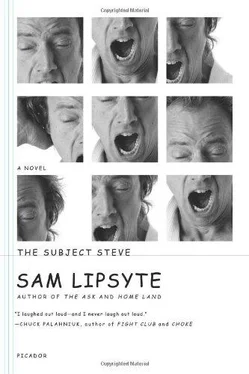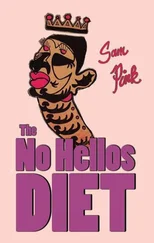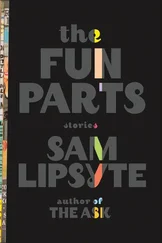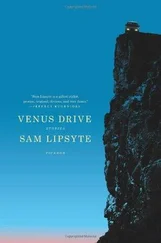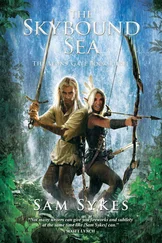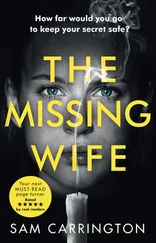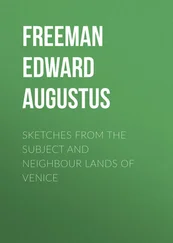Probably he'd be right.
I got up, cased the joint, cat-burgled around, searched and seized. Jewelry, cash, checkbooks, credit cards. The gold rope I gave Maryse one anniversary. The gold earrings I gave her another. Money from all the places I supposed a typical William to keep it-cookie jars, cigar boxes, smuggler's almanacs, antique licorice tins. I scooped up wallets, keys, coins. I rolled William's convertible out of the driveway, gave myself a swift lecture in stick.
"I am me," I said, aimed for the interstate.
I drove to Cudahy's grave. Cudahy had no grave. I parked and walked the pathways of the tony boneyard where somewhere a sandwich-sized wedge of granite bore his name. We'd cindered him, after all, old Cudahy, poured him into the Florentine-where were his ashes now? In mini-storage? On a hock shop shelf? Beside the chipped china and warped seventy-eights at some old biddy's going-out-of-subsistence yard sale? — but an anonymous donor had sprung for a marker, a simple stone in this spare outer lawn, this necropolitan burb, set aside for the absentee dead.
We'd never discovered the name of the donor. We'd never bothered. Who didn't have the distant dowager aunt somewhere, the rumored relation, the cash uncle who'd let you dangle in your day-to-day but who could be counted on to shout for the quality engravature that pronounced your finitude?
I didn't, actually, but we'd all concluded Cudahy did. We'd blown his wad on the big vase, so who else?
Now I walked these stone rows, bent here and there for the stenciled calendrics of Cudahy. I had something to say to him, maybe, or something to say in the vicinity of his granite mention. I walked beneath a low mean sky that somehow made the long lawn lusher. Like it had secret sun in it, a spy for brightness, a sunshine mole. It was deep swollen light, the kind that hung over us that boyhood day we stood beneath the toolshed window, Cudahy and I, propping each other up on a cinder block to peep.
It was our fathers, Cudahy's father, my father, that toolshed not big enough for the one father, let alone two, no room at all in there, really, rake tines porcupined out of barrels, leaf-blowers resting on tarp heaps, hoes, spades, tool chests, bait boxes, cartons of nuts, of bolts, of screws and gears and nails, the weekend handyman's arsenal, his ammo dump, all manner of thingamabob there in casual stockpilage in that dank, mouse-turded dark.
It was all of this and our fathers, fuming.
Because of the mower blade. Because Cudahy's father had borrowed my father's lawn mower and the blade was cracked where maybe it hadn't been cracked before.
I knew all about it. Who didn't at our dinner table? Listen past the clatter of casserole lids and you will never wonder later what murdered your kin. They tell you straight off. They bear you to bear witness. It was the mower blade, the crisis to usurp all crises, and never at a better time, either, the kind of catastrophe that spelled instant amnesia for all the nagging failures of my father's current administration-the unpaid gas bill, the unscooped rain gutters-or even my misdeeds, my messy room, my algebraic woes, my budding notoriety as a tree-torcher, a whiskey thief. The mower blade had buried all the local news. It wasn't a domestic issue, not even a border dispute. It was an international incident.
So here were our fathers, fuming. Our fathers, who'd never dared to like each other anyway, Mr. Cudahy, the buzzcut vet, the grizzled Mama Bell lineman, always with his big, beautiful laugh and those special clips for scaling pole rungs hanging from his belt like some alloyed adjunct to virility-those clips were maybe for scaling tall women, too-and that huge orange lineman's telephone for plugging in anywhere, for listening, for listening in, to his barber, his banker, his boss, to anybody he pleased, to strangers, to housewives, to horny teens, to seditious profs at the community college, or for calling, calling his bookie, calling his chippy, calling home, him clipped to a pole in a rainstorm and wondering what's for dinner-"How about you with a cherry on top, honey?" — for calling in airstrike, death from above, for calling the mayor, the president, or Captain Thornfield, even, for calling in his markers, his favors, his slips, for calling the play, for calling the shots, for calling all of them out , and my father, the Frigidaire elegist, the seawall dreamer, an island of a man whipped by inner monsoon, not a broken man but maybe too much bent, caught in some crooked, voluptuous glide through that no-fly zone between the forestalled and the forsook, my father maybe somehow forging for himself a power in hating this Cudahy, this swaggering, cackling, doubtless Cudahy, a power in caring enough to hate, that soulforce summoned from having a stake in a wager all the fiercer for being finally prizeless-the money, the women, the kicks long paid out, the teller gone, the bank broke-and Mr. Cudahy, Mr. Cudahy maybe never giving my father much thought in the first place, but, if pushed, knowing it was best to hate the crud back, maybe just for being one of the ground-dwellers, one of the surface saps (no rung-buffed boots, no climbing clips, no field phone, no bookie, no nookie), one of the puny, the ant-people, some bitter simp who couldn't be neighborly if he tried, couldn't neighbor his way out of a paper bag, who makes a federal case out of a freaking mower blade, who drags a fine man into a stinking shed to bitch about an old crack in some rusted-to-shit excuse for a lawn maintenance machine, drags him , of all people, drags Cudahy, a near-hero hereabouts, the closest thing to mythic in the township, who toils daily between earth and sky, who is decent and neighborly always, a ladder-lender, a driveway-waver, or if the jerk needs a jump, and not because he gives one shit for the guy, either, not because of anything like that.
Hell, no.
Because of the sons. Because of the friendship of their sons. Because that is something to respect, to value, to fend for (even if the toaster poet doesn't get it, could never even comprehend), because whatever is between these boys deserves to be shielded from ant bitterness, from town pain, because that's it, that's all you get in the end, a friend, one if you're lucky, one who doesn't catch a sapper's bullet in freaking Korea (if you're lucky), one who doesn't wrap his jalopy around an oak trunk (if you're lucky), one who doesn't botch a lifetime of I've-Got-Your-Back with a tipsy grope at the wife (if you're lucky), and who of us is ever truly lucky?
Because of the boys, the sons, who even now were on tippy-toes under the toolshed window, straining for a peep.
"So," we heard my father say, "I guess the rocks really needed some trimming, huh? Figured the yard's all done, might as well mow the rocks while I still have the guy's machine."
"Look, I didn't mow no rocks, Charlie," said Mr. Cudahy. "I'm sorry."
"What are you sorry for? You said you didn't mow any rocks. Or no rocks, rather."
This last was so shameless, so shameful, the fop's swipe, the nerd's gnaw, so laced with the venom of soft men, that I looked to my friend there beneath the sill, beseeched forgiveness, but I don't think Boy Cudahy even caught the slight to his father's speech, or maybe he had, of course he had, it just wasn't the terrible rent in his world I thought it to be, or that maybe my father intended. I saw it a dirk sunk to hilt in the meat of decency, equality, common cause. But to a Cudahy it probably had the same power "four-eyes" would to my bifocaled father. Big whoop. Specs. What else you got?
"I guess," said Mr. Cudahy, his voice going taut now, like cable, like strung bundle, "I guess I'm sorry the mower was broken before you gave it to me."
"Loaned."
"What?"
"I loaned the mower to you."
Читать дальше
